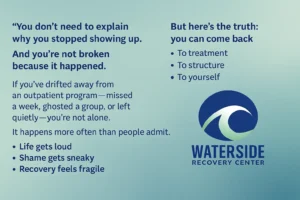You don’t need to explain why you stopped showing up.
And you’re not broken because it happened.
If you’ve drifted away from an outpatient program—missed a week, ghosted a group, or left quietly—you’re not alone. It happens more often than people admit. Life gets loud. Shame gets sneaky. Recovery feels fragile.
But here’s the truth: you can come back.
To treatment.
To structure.
To yourself.
And one of the most powerful ways to reconnect—whether you’re ready to re-engage with a program or not—is to start rebuilding your day.
In this guide, we’ll show you how to create a routine that keeps your sobriety front and center without overwhelming your mind, body, or heart. If you’re in or near Plymouth County, MA, our outpatient team at Waterside Recovery is here when you’re ready to reach out. No shame. No questions. Just care.
1. Start With One Anchor—Not a Whole Overhaul
The goal isn’t to build a perfect schedule overnight. You’re not a failure if your day doesn’t look like a recovery workbook.
Start smaller. Much smaller.
Choose one anchor habit—something consistent, doable, and tied to either the start or end of your day.
Examples:
- Morning anchor: Make your bed, open the blinds, and drink a full glass of water before checking your phone.
- Evening anchor: Turn off screens at 10 p.m., write down three things you did well (not just things you’re grateful for).
This one ritual acts as your home base. It says, I still care about my recovery, even if I don’t feel great right now.
2. Bookend Your Day to Reduce Chaos
Outpatient treatment gave you structure—check-ins, groups, and appointments gave your brain rhythm. When that ends (or you step away), time turns to mush.
You don’t need a packed calendar. But reclaiming just your mornings and nights can give your day shape again.
Morning ideas:
- Read a short recovery reflection
- Move your body, even for 5 minutes
- Listen to a calming or motivational playlist while you get ready
Nighttime ideas:
- Plug your phone in outside your bedroom
- Make a simple plan for the next day (3 things max)
- Listen to a grounding meditation before bed
You’re not trying to be productive—you’re trying to feel human again.
3. Rethink Accountability: It’s Not Punishment
If you left your IOP suddenly, you might feel like reaching back out would invite a lecture, or worse—silence.
But accountability isn’t about being scolded. It’s about being seen.
And being seen can be the lifeline that keeps you from going under.
Try this:
- Text a peer from your old group: “Hey, I’m still here. Thinking of you.”
- Call Waterside Recovery and ask what re-engaging might look like (no pressure).
- DM a sober account you follow and share your micro-win of the day.
Accountability isn’t always about telling someone when you mess up. It can be as simple as saying, I’m still trying.
4. Plan for Boredom—It’s a Recovery Curveball
One of the most dangerous moments in recovery isn’t always craving—it’s boredom.
Boredom says:
“You’re not doing anything with your life.”
“Might as well…”
“At least using made things interesting.”
When you step out of outpatient structure, those long hours can creep back in.
So plan for boredom like it’s a storm. Keep a “boredom backup list” on your fridge or phone. A few ideas:
- Bake cookies you don’t even want to eat
- Rewatch an old comedy that used to make you laugh
- Clean one drawer. Just one.
- Call someone and ask them a question about their life
Boredom isn’t failure. It’s an invitation to remember you can choose something new.
5. Revisit What Worked in Outpatient—Yes, Even Now
Even if you ghosted your outpatient program, it likely left a few tools behind. You don’t have to “deserve” to use them again.
Ask yourself:
- What group felt helpful?
- What skill actually worked (even once)?
- Which counselor made you feel safe?
Even writing down old group mantras or reusing your journal prompts can help ground you again.
If you’re in or near Bristol County, MA, and looking for something familiar but new, our outpatient care might be exactly what you need now—not who you were then.
6. Create Micro-Wins (They Add Up Faster Than You Think)
Sobriety doesn’t always come with fireworks. But small wins stack up—and they teach your brain that recovery is still happening, even on quiet days.
Look for these:
- You answered a message instead of isolating
- You felt anxious and didn’t numb it
- You cleaned part of your space
- You remembered you wanted to stay sober—even if you didn’t feel strong
Celebrate these. Brag about them in a note to yourself. These aren’t crumbs—these are bricks you’re laying.
7. Keep the Door Open—We Still Want You Here
You don’t have to explain your absence to come back. Waterside doesn’t shut the door after missed sessions.
If you’re reading this and feeling like you might be ready to re-engage—or even just ask questions—you’re welcome here.
Treatment isn’t about perfection. It’s about re-orienting, again and again.
FAQ: Building a Routine After Treatment or During IOP Pause
What if I don’t have energy to do anything?
Start with the smallest, least emotional action possible. Even sitting up in bed, brushing your teeth, or texting one friend counts. Motivation follows action—not the other way around.
Can I return to outpatient after ghosting?
Yes. You don’t need a big explanation or apology. Just call. We know how recovery works, and we’re here to meet you where you are. Waterside offers a low-pressure re-entry process for folks who need a reset.
How do I make a routine without feeling controlled or boxed in?
Think of routines as scaffolding, not shackles. You’re not trying to fill every hour—you’re trying to create a few stable stepping stones throughout the day. Flexibility is part of the plan.
Is outpatient treatment really enough?
For many people, yes—especially if you’re rebuilding after a lapse or taking steps toward stability. If you’re not sure what level of care fits your needs now, Waterside can help you sort that out without pressure.
I feel like I failed by leaving. Why try again?
You didn’t fail. You paused. You took a detour. That’s human. What matters is that you’re considering your next step now—and that counts. Every reentry builds muscle. Every return matters.
Call Us—Even If You’re Just Thinking About It
You don’t need a script. You don’t need a reason. You just need a moment of courage.
Call (866)671-8620 or visit our Outpatient Program in Plymouth County, MA to reconnect. We’re here when you’re ready.



